Key takeaways:
- Pro-life advocacy emphasizes the inherent value of life from conception to natural death, encompassing broader issues such as maternal health and family support.
- Effective pro-life activism involves tailoring messages to specific audiences and sharing personal narratives to foster genuine conversations and connections.
- Engaging with the community through events and personal stories helps break down barriers and promotes empathy towards different life choices.
- Utilizing social media enhances outreach, creating dynamic discussions and spreading awareness about pro-life values and support for mothers in crisis pregnancies.
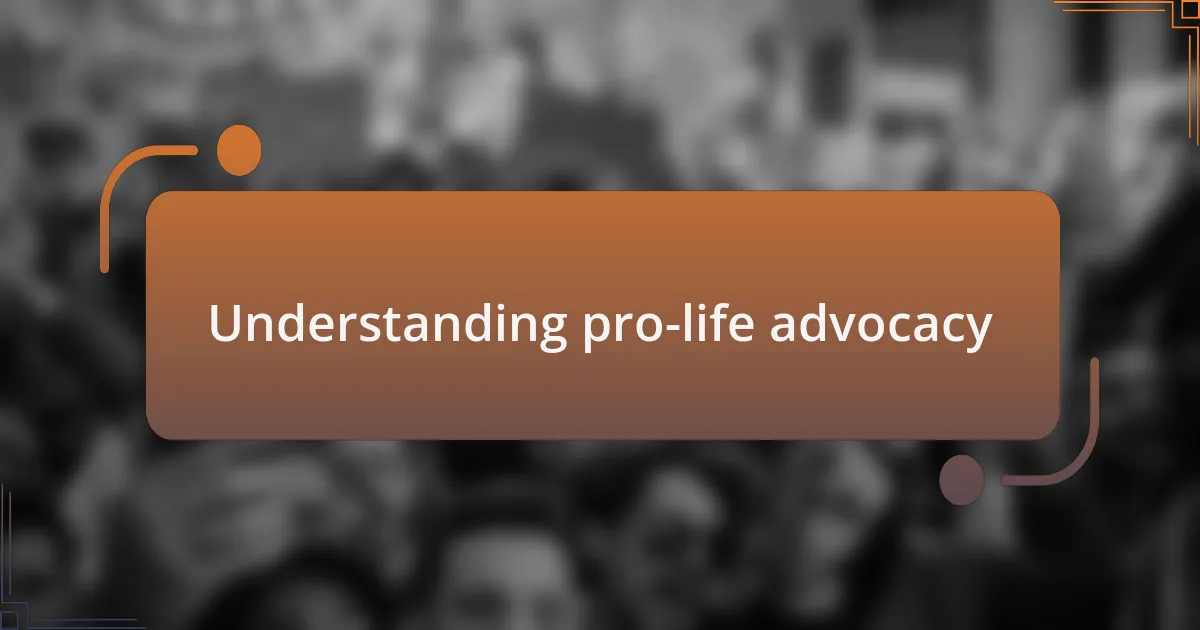
Understanding pro-life advocacy
Pro-life advocacy is rooted in the belief that every human life, from conception to natural death, holds inherent value. My journey in this space has taught me that this conviction often extends beyond the issue of abortion, encompassing broader themes like maternal health and support for young families. When I engage in discussions, I am often reminded of the many facets of life we fight for; it makes me wonder, how can we ensure that both mother and child receive the care they need?
One time, while volunteering at a crisis pregnancy center, I witnessed the profound impact of compassionate support. A young woman walked in, visibly torn and anxious about her unexpected pregnancy. Through our conversation, I understood that for many, the choice is not black and white; it’s filled with emotions, fears, and hopes that deserve empathy. This experience reinforced my belief that activism in the pro-life movement is as much about hearing the stories of individuals as it is about advocating for policies.
Understanding pro-life advocacy also means recognizing the collaborative efforts of diverse groups and individuals pulling together for a common cause. When I attend rallies or community events, I feel the palpable energy of unity among people who share this vision. It makes me ponder: what more can we do to foster a culture that values life, not just at the beginning but also throughout its entirety? This sense of shared mission fuels my passion and deepens my commitment to advocating for comprehensive, life-affirming resources for all.
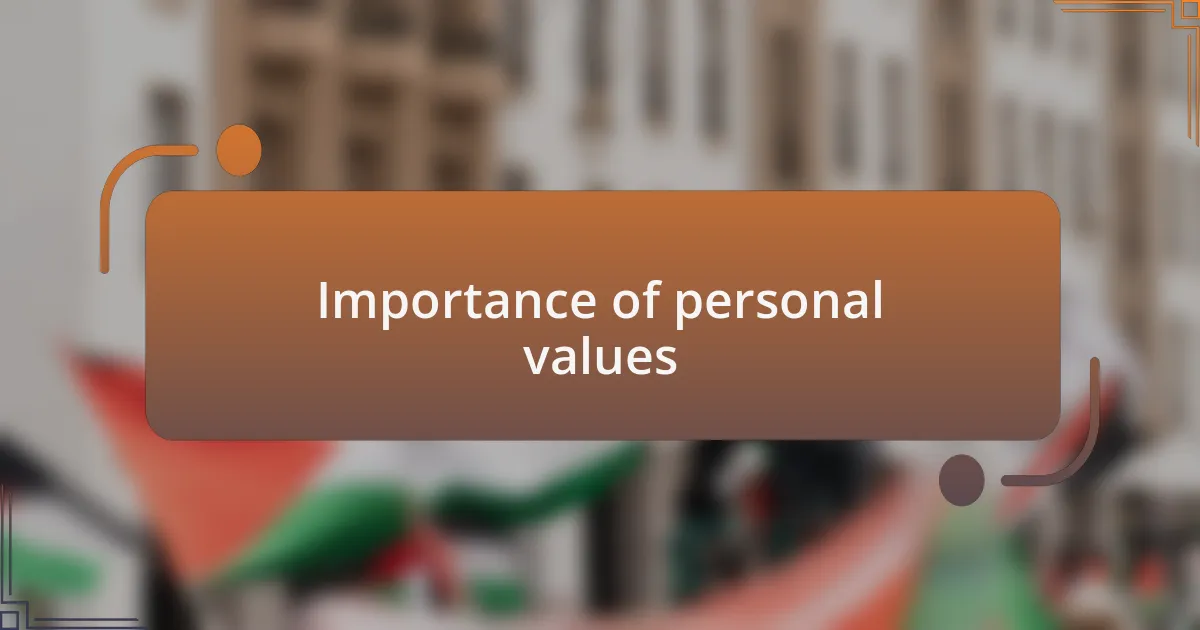
Importance of personal values
Personal values play a pivotal role in shaping our approach to pro-life advocacy. For me, understanding the sanctity of life is not just theoretical; it’s woven into the fabric of my everyday decisions and actions. When I reflect on my reasons for engaging in this movement, I realize that my values guide me, giving me the strength to speak out even when the conversation gets uncomfortable.
One memorable encounter that stands out is when I participated in a local outreach event. I met a father who shared his experience of supporting his partner through an unexpected pregnancy. His bravery in voicing his struggles made me realize that personal values are often forged in the fires of real experiences. It left me asking: how can we build a dialogue that honors the complexities of each story while still upholding the dignity of every life?
When personal values align with advocacy efforts, it creates an authentic connection with others. I’ve found that sharing my own journey, along with the values I hold dear, fosters trust and opens the door to meaningful conversations. It makes me ask: in what ways can our unique perspectives enrich the collective narrative of the pro-life movement? Embracing and expressing these values makes our activism not just effective, but also deeply personal.
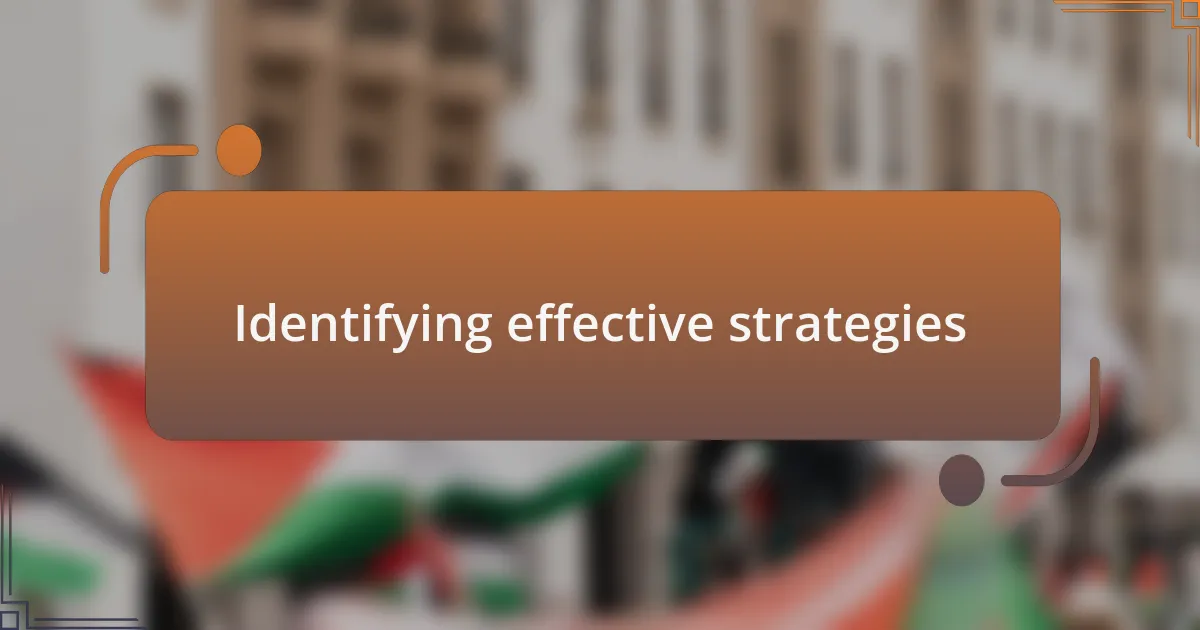
Identifying effective strategies
Identifying effective strategies in pro-life activism hinges on understanding the audience we’re engaging. I’ve realized that tailoring messages to resonate with specific groups—whether they are young students or seasoned professionals—can significantly enhance our outreach efforts. For instance, during a community meeting, I discovered that personal stories often broke through barriers, creating a space for vulnerable discussions about life choices and the complexities surrounding them. Does this suggest that our narratives are the most potent tools we have?
Moreover, collaboration with like-minded organizations can amplify our message. I remember partnering with a local crisis pregnancy center, and together we hosted workshops to educate others about the resources available for expecting parents. The synergy of our combined efforts not only increased attendance but also broadened the reach of our advocacy. Have you considered how connecting with others can enrich your activism and create a more unified front for the pro-life cause?
Finally, leveraging social media has become critical in spreading effective strategies. I often find myself sharing impactful quotes, statistics, and personal reflections that urge my followers to engage in deeper conversations about life. This approach has prompted meaningful dialogue, and I frequently reflect on how a single post can spark curiosity or prompt someone to question their beliefs. Could it be that our online presence plays a crucial role in shaping perceptions and attitudes toward life?
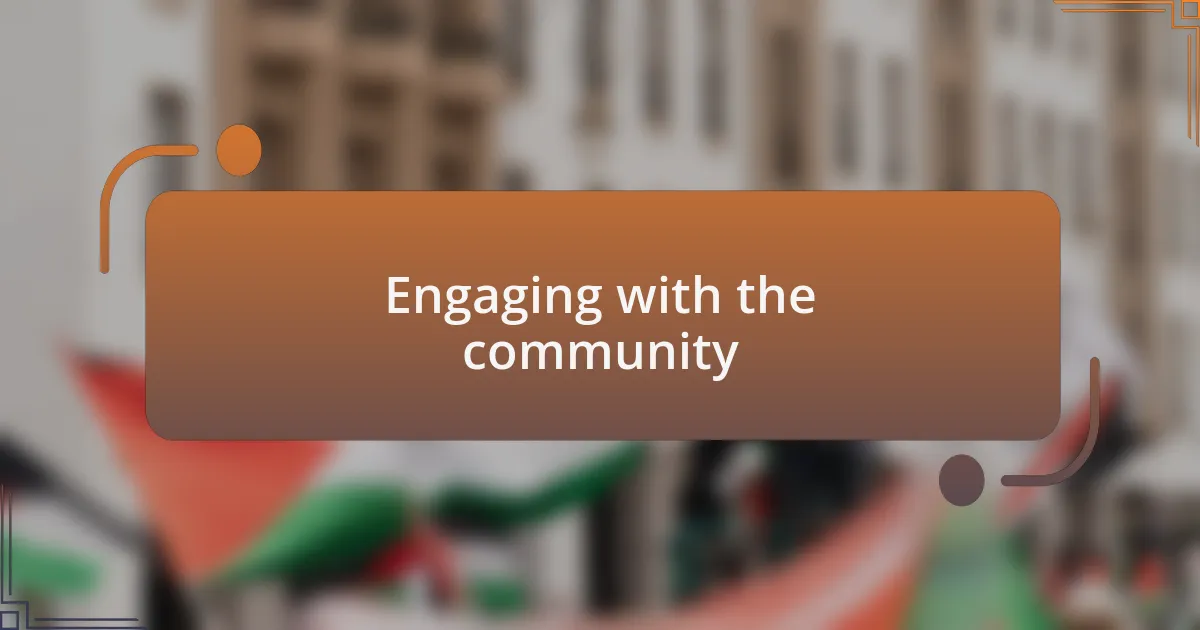
Engaging with the community
Engaging with the community is a powerful way to strengthen our pro-life advocacy. I recall attending a local fair where I set up a booth with informative literature alongside engaging activities for children, which invited families to stop by and chat. It was genuinely inspiring to witness how an approachable setting could engage not just individuals, but entire families in meaningful conversations about life and the choices surrounding it.
In my experience, host community events that allow for open dialogue have always yielded surprising results. Once, I organized a panel discussion that included healthcare professionals, young mothers, and individuals who shared their personal journeys. Hearing these varied perspectives not only drew a crowd but also created an atmosphere of empathy and understanding. Have you ever noticed how sharing personal journeys can transform rigid viewpoints into compassionate discussions?
Moreover, I find that volunteering in community service projects deeply roots our cause in the hearts of others. I’ve joined forces with groups that support women facing unexpected pregnancies, and the gratitude expressed by those we assist has been overwhelmingly uplifting. It makes me wonder: how can our direct involvement not only enrich the lives of others but also inspire them to advocate for life in their own circles?
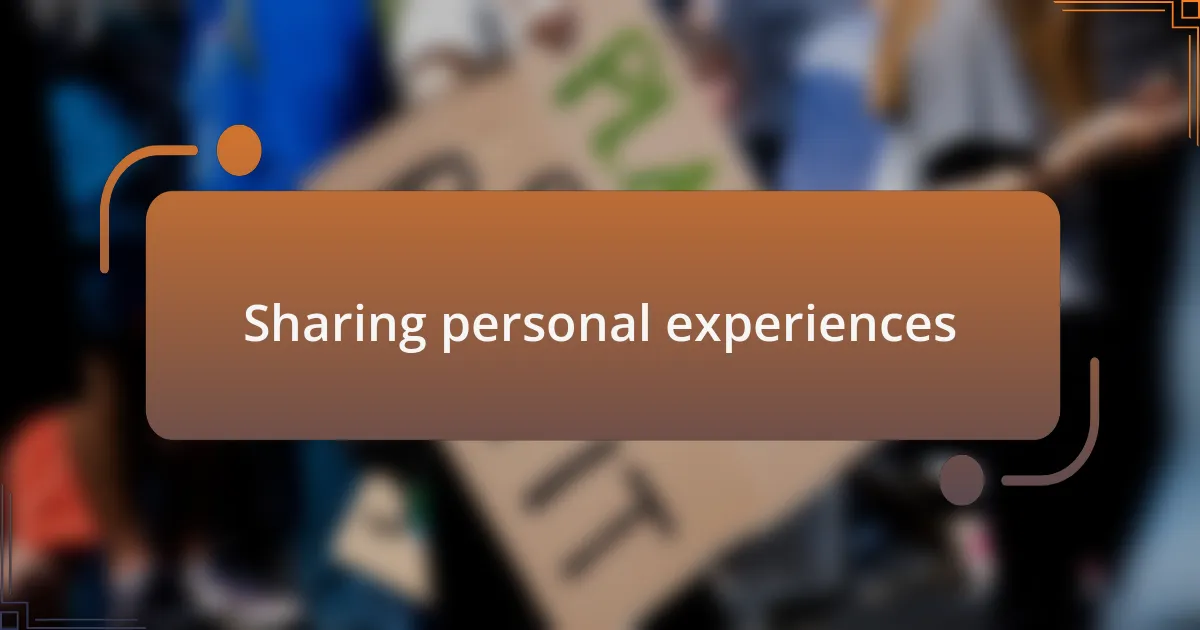
Sharing personal experiences
Sharing personal experiences in pro-life advocacy is a profound way to connect with others. I once shared my own story about the challenges faced during an unexpected pregnancy at a local church event. The room was filled with nods of understanding, and it struck me how vulnerability can break down barriers and invite others to share their truths. Have you ever felt that rush when someone relates to your experience?
I remember another occasion where I facilitated a workshop for young women. Encouraging them to share their stories created a safe space filled with laughter and tears. Each narrative helped reinforce the idea that we are not alone in our journeys. Isn’t it incredible how personal experiences can create a tapestry of support among individuals who may have different backgrounds but share similar struggles?
In a recent discussion with a friend who had chosen adoption, I was moved by how her journey impacted her life and the lives of others. She recounted the warmth of the families she met during the process and how her story encouraged others to consider adoption. It made me ponder: how many lives can our stories touch, shaping perceptions and encouraging open hearts in a world often filled with judgment?
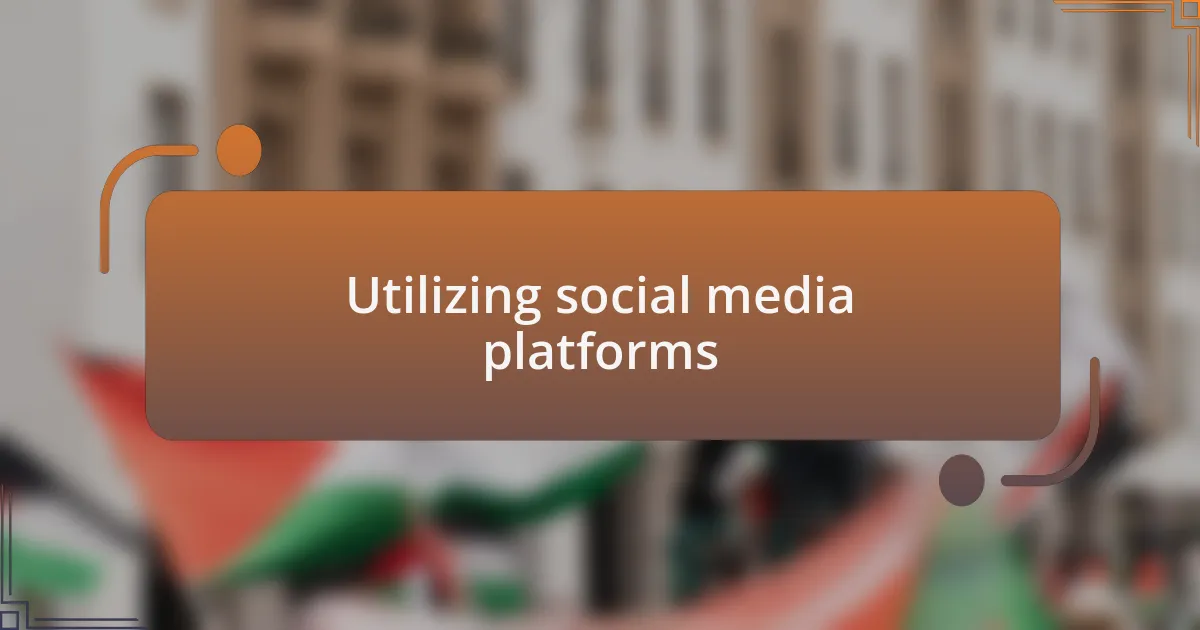
Utilizing social media platforms
Social media platforms have become an indispensable tool for pro-life advocacy. I remember crafting a heartfelt post about the importance of supporting mothers in crisis pregnancies and how it sparked a surge of responses. It was fascinating to see people engage in dialogue, sharing their own insights and experiences in the comments. Have you ever witnessed how a simple post can ripple out and touch numerous lives?
One evening, I decided to host an Instagram Live session to address common misconceptions about the pro-life movement. I shared research and personal stories, while viewers asked questions in real-time. The interaction was electric, and it felt rewarding to dispel myths while connecting with individuals who genuinely wanted to learn. Isn’t it powerful how social media can turn a solitary effort into a dynamic community conversation?
Additionally, I often create short videos sharing impactful quotes from influential pro-life leaders. Those snippets resonate well with my audience, prompting emotional reflections that extend beyond the screen. When I see likes and shares from people who might not have engaged otherwise, it drives home the point: social media isn’t just about broadcasting; it’s about creating an ongoing conversation that can inspire change. Don’t you think sharing meaningful content can amplify our voices in significant ways?
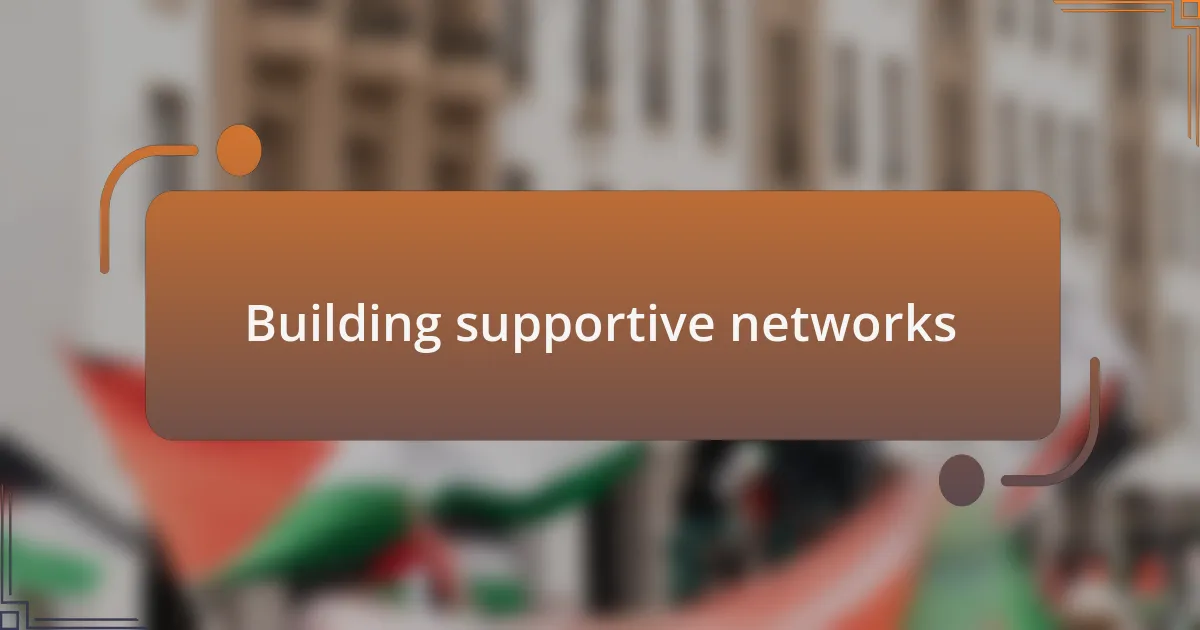
Building supportive networks
Building supportive networks is essential in pro-life activism. I once attended a local meeting organized by a nearby pregnancy resource center, and the sense of camaraderie was remarkable. Everyone was there with a shared purpose, exchanging ideas, resources, and contacts. Have you ever felt that strong sense of belonging, knowing you’re part of something greater?
In my experience, personal connections can dramatically enhance the advocacy journey. I recall reaching out to a fellow activist who specialized in legislative efforts. Our collaboration led to a successful campaign to inform our community about pro-life policies. The shared burden felt lighter, and our diverse skill sets complemented each other perfectly. Have you had a moment when teamwork transformed a daunting task into an achievable goal?
Moreover, I’ve found that informal gatherings—like coffee meetups or book clubs focused on pro-life literature—offer a fantastic platform for building relationships. During one such gathering, we shared personal stories about our journeys in activism, building trust and accountability among us. It reminded me how crucial it is to nurture these connections. Don’t you agree that creating a supportive network can make a world of difference in our collective efforts?